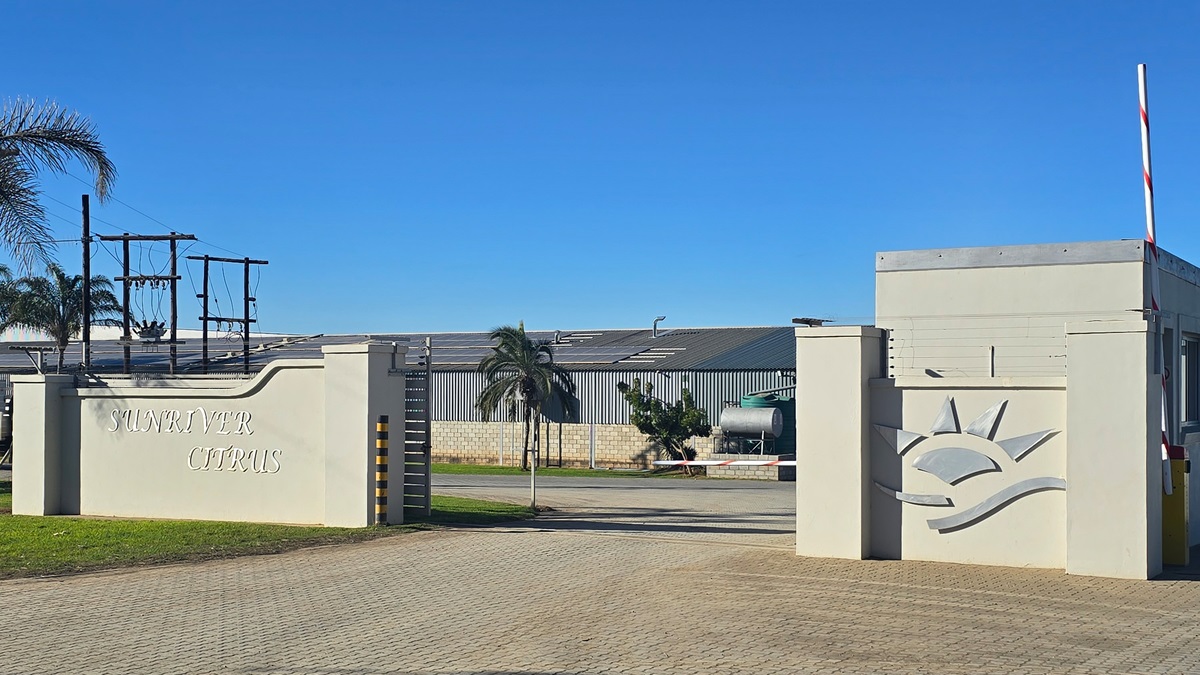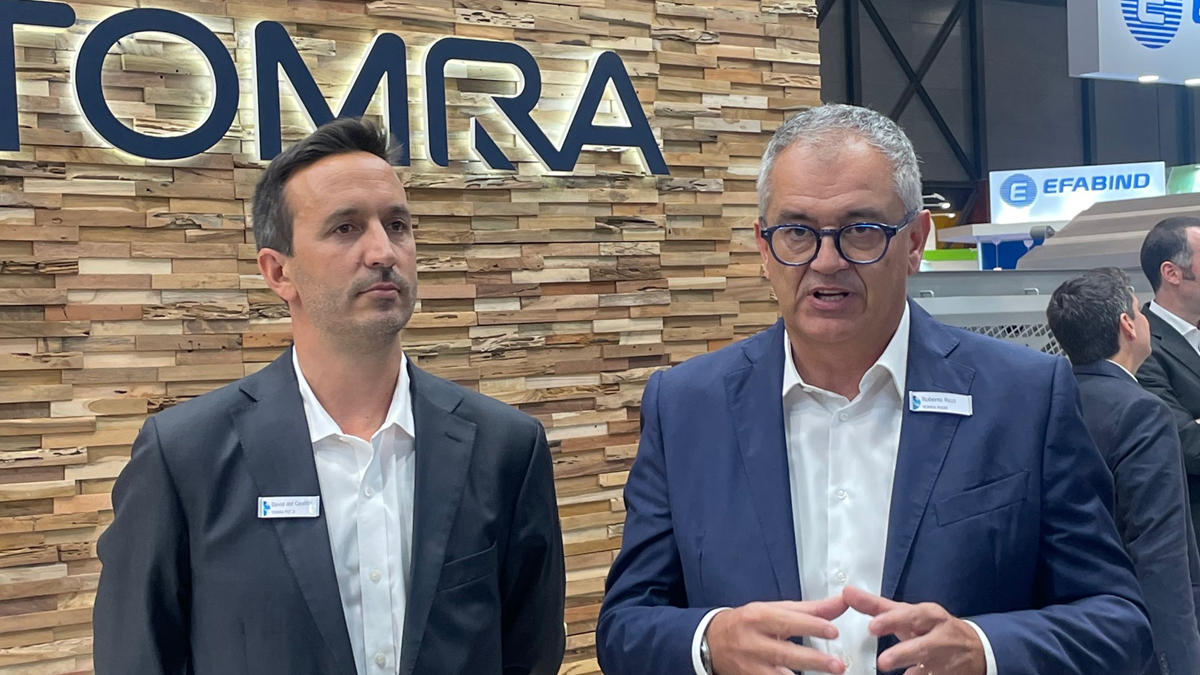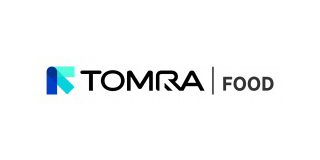

TOMRA Food
Conditioning
TOMRA LUCAi™ for InVision 2 grading platform boosts efficiency and profitability of cherry packing operations
The new LUCAi™ platform for InVision 2 leverages TOMRA’s Deep Learning technology to add value to cherry packing and introduces a new user-friendly interface to simplify operation
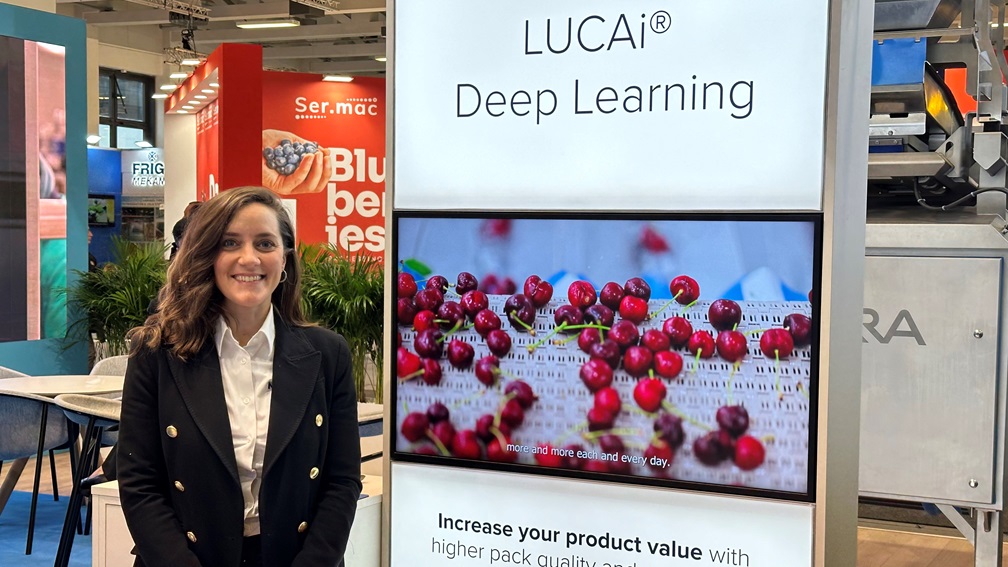
The continued rise in global demand for cherries puts packhouses under pressure to process increasingly large volumes while maintaining the high quality of their product. Significant variations in the infeed product, disruptive weather events, the careful handling that cherries require, and labor availability are some of the major challenges packers face as they strive to meet the demand and customers’ product specifications. The new LUCAi™ technology for the InVision 2 grading platform allows them to optimize pack-out, increase yield and efficiencies, and ensure top-quality cherries with unparalleled accuracy in detecting defects.
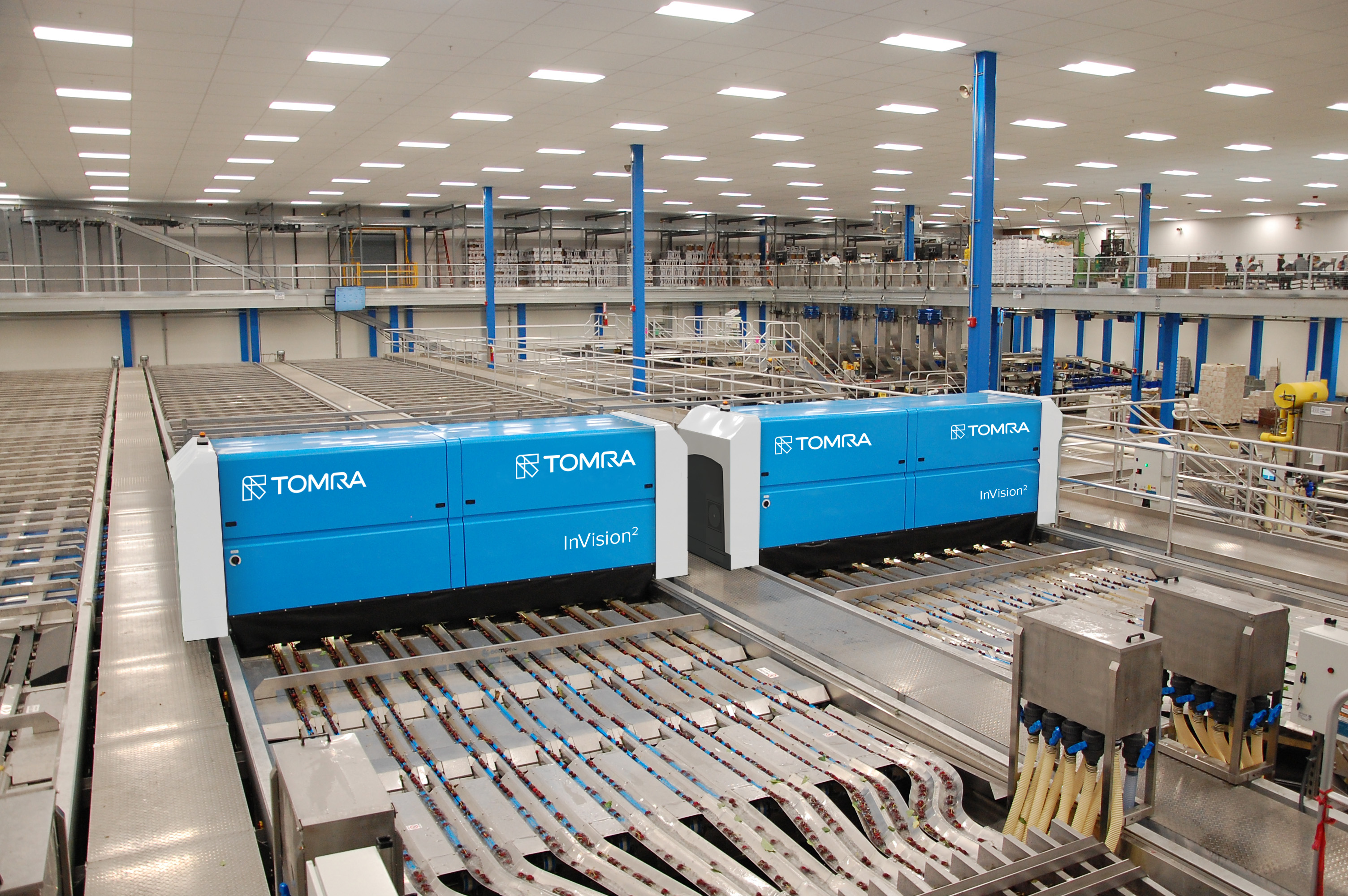
A substantial leap forward
The new LUCAi™ platform features the latest development of TOMRA’s Deep Learning technology, which uses pre-trained models to teach computers how to process data, such as complex patterns in photos, to achieve unprecedented grading precision. This technology was developed by a team of industry-leading scientists, engineers, researchers and experts, and applied successfully to blueberry and apple applications - on the KATO260 and most recently on the Spectrim X platforms respectively. TOMRA Food’s engineers combined this expertise with their in-depth knowledge of cherry sorting, grading and packing to extend the advantages of LUCAi™ technology to the InVision 2 grading platform.
Benedetta Ricci Iamino, Global Category Director – Cherries at TOMRA Food says:
“LUCAi™ for InVision 2 represents a substantial leap forward in grading accuracy, enhanced pack-out returns while reducing food waste thanks to exceptionally low good-in-bad and bad-in-good ratios, and higher productivity. The LUCAi™ platform, in fact, allows TOMRA customers to process cherries at a higher speed (+15% kg per hour per lane) while optimizing defect sorting. It helps them to achieve higher returns per kg packed than any other technology available today, reducing their food waste, and enhancing their reputation for consistent quality in the markets. Another advantage is its new interface, which is very user-friendly, making it easy and quick for operators to adapt to the technology.”
The intelligent InVision 2 grading platform with LUCAi™ allows packhouses to maximize pack-out results, enhancing pack quality and consistency while minimizing waste and increasing premium yields. It uses TOMRA’s Deep Learning technology to identify edge cracks, pacman cherries (half cherries), open sutures, cosmetic blemishes and stem pulls. It also improves detection of spurs, cracks and all defects around the stem area with unparalleled accuracy. LUCAi™ has been trained on vast amounts of data collected from cherry growers across the world and, thanks to its “intelligence”, it is able to recognize patterns on the cherries regardless of their varieties, quality and entry conditions, preventing accidental downgrades of good fruit while eliminating slowdowns due to manual grading of bad fruits – all of this in the most consistent and efficient way.
The advanced software allows the grading platform to process high throughput, resulting in higher productivity, while maintaining consistency across seasons, batches, varieties and operators. This is a major advantage for cherry packers, for whom product quality is where their greatest returns come from – but also the biggest operational challenges.
Ready-to-use and future-proof
LUCAi™ for the InVision 2 cherry grading platform uses pre-trained models built on a wealth of data and knowledge collected in multiple regions across the world for the past 5 years. Benedetta explains:
“It is important to understand that AI technology is an empty box you need to fill; without a large amount of quality data, it goes nowhere. That’s where LUCAi™ stands out from any other AI platform available in the industry: it comes with vast amounts of data that TOMRA has collected over more than 5 years, building pre-trained models using real images of cherries that our customers pack, continuously developing LUCAi™’s ‘brain’, which becomes smarter and smarter in the process. This means that it is ready ‘out of the box’, able to deliver its superior sorting and grading performance as soon as it is installed at our customers’ operation.”
TOMRA’s LUCAi™ technology platform not only comes ready to perform with pre-trained models, but it can also continue to evolve as it collects more data when operating at the customer’s operation and keeps learning. “It becomes smarter, and consequently more powerful and precise over time,” says Benedetta. “It is future-proof.”
With LUCAi™, cherry packers also benefit from TOMRA’s support. The Service team can help them build tailored models that address issues with the varieties and defects specific to their operation, so that the platform performs to meet their precise needs and quality requirements.
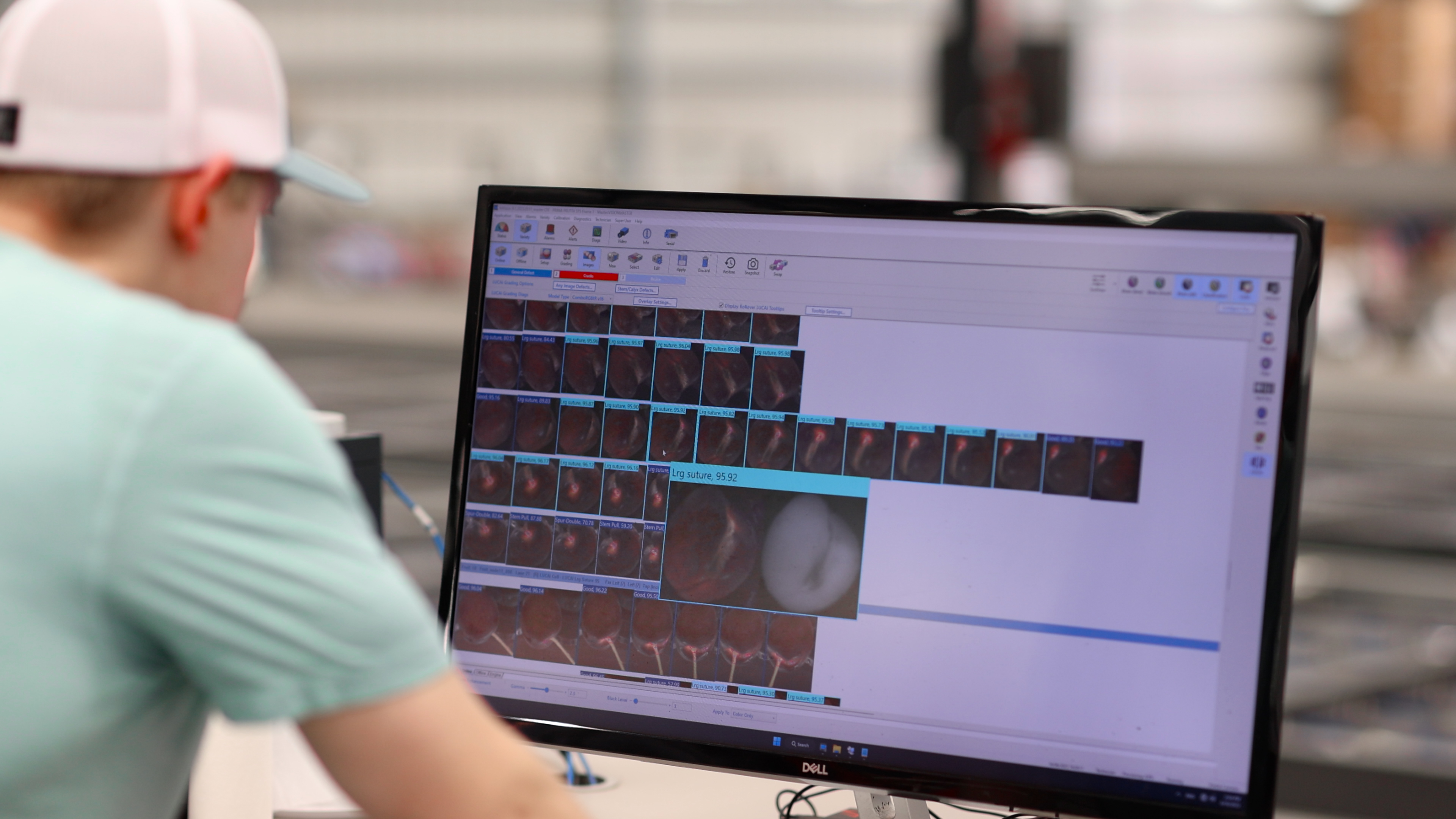
Tried and tested in the field
Benedetta Ricci Iamino explains:
“A key phase in TOMRA Food’s product development process is testing in the field, in real conditions with customers. That’s exactly what we have done when extending our LUCAi™ Deep Learning technology to cherries: we tested and validated it in California and New Zealand, during the past two seasons, collecting more data and working with our customers to help them build models to address their specific issues.”
In California, USA, Prima Frutta Packing have been using TOMRA’s LUCAi™ technology in their cherry packing operation with excellent results. It has enabled them to increase production and packing efficiencies (kg per hour per person) with the same workforce, allowing them to keep up with the short cherry harvest window while maintaining the high quality of their product. This is especially valuable in a challenging season like last year’s when the cherries were about 3 weeks late and came to maturity all at once. They have successfully trained TOMRA’s Deep Learning technology to accurately detect defects such as powdery mildew defects, insect bites and freshwater cracks after rain, which they would find very difficult with their traditional mapping system. The user-friendly operation was another big advantage they highlighted.
Tim Sambado, President of Prima Frutta Packing, is thrilled with TOMRA’s LUCAi™ technology:
“It’s really exciting to see how the system is going to evolve. I think we’ve just scratched the surface. I think there’s a lot more ahead of us.”
The new LUCAi™ for InVision 2 grading platform will be available on the market in the Southern Hemisphere for the 2024 cherry season, with other regions to follow.
About TOMRA Food
TOMRA Food designs and manufactures sensor-based sorting machines and integrated post-harvest solutions transforming global food production to maximize food safety and minimize food loss, by making sure Every Resource Counts TM .
The company has more than 13,800 units installed at food growers, packers and processors around the world for Confectionery, Fruit, Dried fruit, Grains and Seeds, Potatoes, Proteins, Nuts, and Vegetables.
These solutions include advanced grading, sorting, peeling and analytical technology to help businesses improve returns, gain operational efficiencies, and ensure a safe food supply.
TOMRA Food operates centers of excellence, regional offices and manufacturing locations within the United States, Europe, South America, Asia, Africa and Australasia.
Follow TOMRA Food on Facebook @TOMRA.Food, X @TOMRAFood, Instagram @TOMRAFood, LinkedIn at TOMRA Food and YouTube at TOMRA Food..
TOMRA Food is a division of TOMRA Group. TOMRA was founded in 1972 that began with the design, manufacturing and sale of reverse vending machines (RVMs) for automated collection of used beverage containers.
Today, TOMRA is leading the resource revolution to transform how the planet’s resources are obtained, used and reused to enable a world without waste. The company’s other business divisions are TOMRA Recycling and TOMRA Collection.
TOMRA has approximately 105,000 installations in over 100 markets worldwide and had total revenues of about 12 billion NOK in 2022. The Group employs 5,000 globally and is publicly listed on the Oslo Stock Exchange. The company headquarters are in Asker, Norway.
For further information about TOMRA, visit www.tomra.com.



